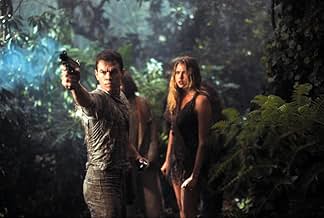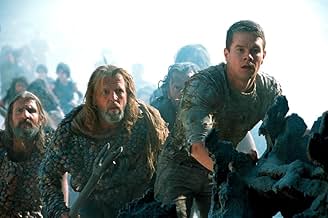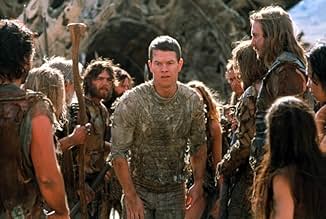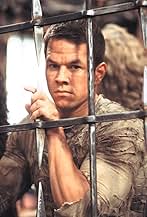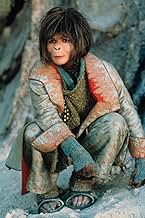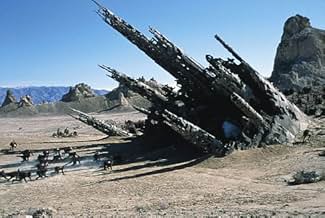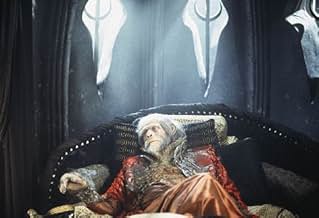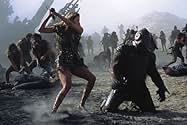2029 stürzt ein Astronaut der Air Force auf einem mysteriösen Planeten ab, wo hochentwickelte, sprechende Affen über primitive Menschen herrschen.2029 stürzt ein Astronaut der Air Force auf einem mysteriösen Planeten ab, wo hochentwickelte, sprechende Affen über primitive Menschen herrschen.2029 stürzt ein Astronaut der Air Force auf einem mysteriösen Planeten ab, wo hochentwickelte, sprechende Affen über primitive Menschen herrschen.
- Nominiert für 2 BAFTA Awards
- 11 Gewinne & 32 Nominierungen insgesamt
Evan Parke
- Gunnar
- (as Evan Dexter Parke)
Empfohlene Bewertungen
"Planet of the Apes" (2001), despite its title, is not exactly a remake or sequel to the old ape movies from the 1960s-70s. So much of the plot is different, I see it more as a reimagining of the story.
As far as this film goes, it isn't rated all that well. Additionally, the star, Mark Wahlberg, made public statements about how the studio ruined this film...mostly by giving the director Tim Burton impossible to meet deadlines...resulting in a rushed movie. You might want to know that I am a big fan of the original series...so impressing me won't be easy.
Speaking of impressing....the ape costumes and makeup are insanely good. I thought they were CGI but when I read Rick Baker actually used practical effects to make the apes, I was shocked. It is really amazing...and it makes we wonder how the newer ape movies could be better...that is, for the male apes. The female apes look creepy and almost like an entirely different species. They could have used some work.
The story is very different. It begins in 2029 on a space station. Captain Davidson (Wahlberg) goes out in a space craft during some weird space storm to retrieve a chimp astronaut (a 'normal' Earth-type chimp...not a scary one like you'll later see in the film). His ship goes out of control...flying through space and crashing on some planet controlled by apes.
These apes manage to be even crueler and meaner than those in the original films...as well as acting more ape-like. Among them, the most ardently anti-human and evil is Thade...and after the Captain an some other humans escape from their incarceration, he's excited about how to use this not only to kill humans but gain power.
So is this any good? Well, it's a heck of a lot better than the paltry 5.7 score it now has. It would have you think the film is very poor...and it certainly isn't. While I hate remakes and reimaginations, this one kept my interest and I enjoyed it very much. And, since the newer reboot is supposed to be better, the film has me wanting to see more.
By the way, the very end scene is neat...and makes no sense whatsoever...one of the weakest parts of the story, actually.
As far as this film goes, it isn't rated all that well. Additionally, the star, Mark Wahlberg, made public statements about how the studio ruined this film...mostly by giving the director Tim Burton impossible to meet deadlines...resulting in a rushed movie. You might want to know that I am a big fan of the original series...so impressing me won't be easy.
Speaking of impressing....the ape costumes and makeup are insanely good. I thought they were CGI but when I read Rick Baker actually used practical effects to make the apes, I was shocked. It is really amazing...and it makes we wonder how the newer ape movies could be better...that is, for the male apes. The female apes look creepy and almost like an entirely different species. They could have used some work.
The story is very different. It begins in 2029 on a space station. Captain Davidson (Wahlberg) goes out in a space craft during some weird space storm to retrieve a chimp astronaut (a 'normal' Earth-type chimp...not a scary one like you'll later see in the film). His ship goes out of control...flying through space and crashing on some planet controlled by apes.
These apes manage to be even crueler and meaner than those in the original films...as well as acting more ape-like. Among them, the most ardently anti-human and evil is Thade...and after the Captain an some other humans escape from their incarceration, he's excited about how to use this not only to kill humans but gain power.
So is this any good? Well, it's a heck of a lot better than the paltry 5.7 score it now has. It would have you think the film is very poor...and it certainly isn't. While I hate remakes and reimaginations, this one kept my interest and I enjoyed it very much. And, since the newer reboot is supposed to be better, the film has me wanting to see more.
By the way, the very end scene is neat...and makes no sense whatsoever...one of the weakest parts of the story, actually.
In the spring of 2001 audiences seemed eager to see Tim Burton's retelling of the 1968 classic, "Planet of the Apes." By the summer of 2001 it seemed to be the movie everybody loved to hate. Were the criticisms fair? Not if you ask me.
2001's Planet of the Apes' biggest downfall, in my opinion, is unfortunately also it's biggest strength. Unlike many remakes which often end up as nothing more than weaker rehashes of their predecessor's this version of 'Apes' dared to be different. The plot has been stripped down to its bare bones and then rebuilt into something completely new. This is refreshing, if you ask me. Especially when rewatching it now, because just a few short years after this film came out we launched into sort of a remake renaissance, where half the tent pole films that come out every year are the same lesser rehashes that I spoke of a second ago. This film does take a moment here and there to wink at the '68 original, but Burton and his merry band of screenwriters has created a world completely original...it could be watched next to any entry of that original series as a wholey different film.
This is also the film's biggest flaw though, or at least financially speaking, because the original 'Apes' franchise has a cult following behind it that could almost rival that of Star Wars or Star Trek. The core audience for this film really only wanted to see their favourite story told with modern day effects and makeup. I don't think we needed that, but I'm not sure how many would agree with me.
Now, if you want to compare the two films plots and decide which one is stronger that's a whole other debate. But I don't think that's fair, that's why I champion it for taking such a different approach. I don't think this movie should be compared to any other movie and with that mindset a much better appreciation can be found. To put it bluntly, this movie ain't bad...in fact it's actually pretty good.
I won't deconstruct the plot for you...if you're interested enough to be reading this you probably at least know the jist of it anyway. But it's a solid and interesting plot that sets up a very fun and entertaining action adventure flick. Visually its in many ways a departure from typical Burton fair but his stamp is definitely evident in its art direction, and the atmosphere he creates in this jungle/desert/urban/high tech universe is really something to behold. The apes are not only impressive in terms of makeup but they are also creatively impressive from the choices of the species to match personalities, the incredible costumes and simply perfect performances by a cast who act through all that latex. And while I'm praising I'll also throw up a shout out for Danny Elfman's great score, which just might be one of his best.
The only caveat I'll lay on the movie is that the twist ending, obviously conceived to rival the famous twist of the original, kind of falls flat. BUT...considering how many instalments the original franchise had I have no doubt that the producers had hoped to make a sequel had this film been more financially successful, and had that sequel been made maybe we would've learned the story behind this twist and all would've been forgiven.
It's a little too late to say, 'long story short,' but I will anyway. Give this movie a fair shot. It may not be without its flaws but how many movies are? Try not to compare it to the original, just watch it with a bowl of popcorn and have fun.
2001's Planet of the Apes' biggest downfall, in my opinion, is unfortunately also it's biggest strength. Unlike many remakes which often end up as nothing more than weaker rehashes of their predecessor's this version of 'Apes' dared to be different. The plot has been stripped down to its bare bones and then rebuilt into something completely new. This is refreshing, if you ask me. Especially when rewatching it now, because just a few short years after this film came out we launched into sort of a remake renaissance, where half the tent pole films that come out every year are the same lesser rehashes that I spoke of a second ago. This film does take a moment here and there to wink at the '68 original, but Burton and his merry band of screenwriters has created a world completely original...it could be watched next to any entry of that original series as a wholey different film.
This is also the film's biggest flaw though, or at least financially speaking, because the original 'Apes' franchise has a cult following behind it that could almost rival that of Star Wars or Star Trek. The core audience for this film really only wanted to see their favourite story told with modern day effects and makeup. I don't think we needed that, but I'm not sure how many would agree with me.
Now, if you want to compare the two films plots and decide which one is stronger that's a whole other debate. But I don't think that's fair, that's why I champion it for taking such a different approach. I don't think this movie should be compared to any other movie and with that mindset a much better appreciation can be found. To put it bluntly, this movie ain't bad...in fact it's actually pretty good.
I won't deconstruct the plot for you...if you're interested enough to be reading this you probably at least know the jist of it anyway. But it's a solid and interesting plot that sets up a very fun and entertaining action adventure flick. Visually its in many ways a departure from typical Burton fair but his stamp is definitely evident in its art direction, and the atmosphere he creates in this jungle/desert/urban/high tech universe is really something to behold. The apes are not only impressive in terms of makeup but they are also creatively impressive from the choices of the species to match personalities, the incredible costumes and simply perfect performances by a cast who act through all that latex. And while I'm praising I'll also throw up a shout out for Danny Elfman's great score, which just might be one of his best.
The only caveat I'll lay on the movie is that the twist ending, obviously conceived to rival the famous twist of the original, kind of falls flat. BUT...considering how many instalments the original franchise had I have no doubt that the producers had hoped to make a sequel had this film been more financially successful, and had that sequel been made maybe we would've learned the story behind this twist and all would've been forgiven.
It's a little too late to say, 'long story short,' but I will anyway. Give this movie a fair shot. It may not be without its flaws but how many movies are? Try not to compare it to the original, just watch it with a bowl of popcorn and have fun.
Tim Burton's new "Planet of the Apes" is actually a remake--excuse me, a "re-imagining"--of the first TWO movies of the old series. Its occasional paraphrasing of lines from the original movie (devoid of any meaningful context), and its cameos by members of the original cast (Charlton Heston and Linda Harrison), only underscore that this new version isn't what the original was, i.e., an original. Mark Wahlberg, as Our Hero, has none of the cynical, edgy complexity of Heston's Taylor, and is in fact the sort of can-do flyboy Taylor found laughable. Much as I adore Helena Bonham Carter, her turn as Ari, a sultry, sexy, meddling, annoying human-rights activist, is ultimately tiresome, and absolutely incomparable to Kim Hunter's brave, brilliant, impish Zira of the old series. The role is also a criminal waste of Bonham Carter's beauty, hidden as it is behind a bizarre makeup that looks neither ape nor human. Rick Baker's highly-touted ape makeups (which I've enjoyed since the days of "Schlock" and "Kentucky Fried Movie") are highly uneven here. Tim Roth's villainous Thade has the best, with most of the rest being just adequate and no particular improvement over John Chambers' work in the original. And the socko ending (keep reading; I won't spoil it for you) is simply tacked on: unlike the jolting end of the original, it neither ties together nor arises from the movie's earlier action in a way that Explains Everything. Instead, it begs so many questions (mainly "How the heck did THAT happen?") that it seems engineered (or contrived) solely to set the stage for more sequels. All told, this is "Apes Lite," a comic-bookish caricature of the original, made for the short-attention-span crowd. It made me want to do something I hadn't done in ages: fire up the VCR and roll the original again. It's typical of the 1968 movie's gritty, clever irony that the first word of dialogue uttered by an ape--his entire line, in fact--is "Smile."
If one wants to remake a movie, the best option is probably to choose and original that was good, but not a great classic. Clearly, any attempt to remake a concept that failed first time around is fraught with danger, but an attempt to remake a classic runs the risk that one's film will be unfavourably compared with the original. The original 1968 film of 'Planet of the Apes' is one of cinema's great science fiction classics. More than an adventure story, it touches on some of the concerns of the late sixties- the fear of nuclear war, race relations- and also raises more fundamental issues about the relationship between man and nature, the relationship between religion and science, Darwinism and animal rights. It was therefore a brave move on Tim Burton's part to try and remake it.
The main concept of Tim Burton's film is basically similar to Franklin Schaffner's. An astronaut from Earth travels to a planet ruled by intelligent apes. Humans exist on this planet, but they are regarded as an inferior species, despised and exploited by the apes. There is, however, an important difference. In the original film, the apes are the only intelligent and articulate beings on the planet. Although they have only attained a pre-industrial level of civilization (they have firearms, but no power-driven machinery, and no means of transport other than the horse or horse-drawn vehicles), they are a far more advanced species than the planet's human inhabitants, who lack the powers of speech and reason and live an animal-like existence. In Burton's remake, humans and apes have similar powers of speech and intellect; it is only the apes' greater physical strength that enables them to dominate the planet and to treat the humans as slaves.
It was this ironic role-reversal, with apes behaving like men and men behaving like beasts, that gave Schaffner's film its satirical power. That film was advertised with the slogan 'Somewhere in the Universe, there must be something better than man!', and the apes are indeed, in some respects, better than man. Their law against killing others of their kind, for example, is much more strictly observed than our commandment that 'Thou shalt do no murder'. There is no sense that the apes are bad and the humans good. Even Dr Zaius, the orang-utan politician, is not a wicked individual; by the standards of his society he is an honourable and decent one. His weakness is that of excessive intellectual conservatism and unwillingness to accept opinions that do not fit in with his preconceived world view. (In this respect the apes are very human indeed).
Burton's film takes a less subtle moral line. It is a straightforward story of a fight for freedom. The villains are most of the apes, especially the fanatical, human-hating General Thade. The heroes are Captain Davidson, the astronaut from Earth, the planet's human population who long for freedom from the domination of the apes, and a few liberal, pro-human apes, especially Ari, the daughter of an ape senator. The apes are more aggressive and more obviously animals than in the original film; they still frequently move on all fours and emit fierce shrieks whenever angry or excited.
There are some things about this film that are good, especially the ape make-up which is, for the most part, more convincing than in the original film and allows the actors more scope to show emotion. (I say 'for the most part' because Ari looks far less simian than do most of the other apes- Tim Burton obviously felt that the audience would be more likely to accept her as a sympathetic character if she looked half-human). The actors playing apes actually seem more convincing than those playing humans. Tim Roth is good as the militaristic Thade, as is Helena Bonham-Carter as Ari. Mark Wahlberg, on the other hand, is not an actor of the same caliber as Charlton Heston, who played the equivalent role in the original film, and Estella Warren has little to do other than look glamorous. (Heston has a cameo role as an ape in Burton's film, and even gets to repeat his famous line 'Damn you all to hell').
Overall, however, the film is a disappointment when compared to the original, a simple science-fiction adventure story as opposed to an intelligent and philosophical look at complex issues. It tried to copy the device of a surprise ending but failed. Schaffner's famous final twist is shocking, but makes perfect sense in the context of what has gone before. Burton's makes no sense whatsoever.
Tim Burton can be a director of great originality, but with 'Planet of the Apes' he fell into the standard Hollywood trap of trying to copy what had already been done and remaking a film that never needed to be remade. It was good to see him return to form with the brilliant 'Big Fish', one of the best films of last year. 6/10
The main concept of Tim Burton's film is basically similar to Franklin Schaffner's. An astronaut from Earth travels to a planet ruled by intelligent apes. Humans exist on this planet, but they are regarded as an inferior species, despised and exploited by the apes. There is, however, an important difference. In the original film, the apes are the only intelligent and articulate beings on the planet. Although they have only attained a pre-industrial level of civilization (they have firearms, but no power-driven machinery, and no means of transport other than the horse or horse-drawn vehicles), they are a far more advanced species than the planet's human inhabitants, who lack the powers of speech and reason and live an animal-like existence. In Burton's remake, humans and apes have similar powers of speech and intellect; it is only the apes' greater physical strength that enables them to dominate the planet and to treat the humans as slaves.
It was this ironic role-reversal, with apes behaving like men and men behaving like beasts, that gave Schaffner's film its satirical power. That film was advertised with the slogan 'Somewhere in the Universe, there must be something better than man!', and the apes are indeed, in some respects, better than man. Their law against killing others of their kind, for example, is much more strictly observed than our commandment that 'Thou shalt do no murder'. There is no sense that the apes are bad and the humans good. Even Dr Zaius, the orang-utan politician, is not a wicked individual; by the standards of his society he is an honourable and decent one. His weakness is that of excessive intellectual conservatism and unwillingness to accept opinions that do not fit in with his preconceived world view. (In this respect the apes are very human indeed).
Burton's film takes a less subtle moral line. It is a straightforward story of a fight for freedom. The villains are most of the apes, especially the fanatical, human-hating General Thade. The heroes are Captain Davidson, the astronaut from Earth, the planet's human population who long for freedom from the domination of the apes, and a few liberal, pro-human apes, especially Ari, the daughter of an ape senator. The apes are more aggressive and more obviously animals than in the original film; they still frequently move on all fours and emit fierce shrieks whenever angry or excited.
There are some things about this film that are good, especially the ape make-up which is, for the most part, more convincing than in the original film and allows the actors more scope to show emotion. (I say 'for the most part' because Ari looks far less simian than do most of the other apes- Tim Burton obviously felt that the audience would be more likely to accept her as a sympathetic character if she looked half-human). The actors playing apes actually seem more convincing than those playing humans. Tim Roth is good as the militaristic Thade, as is Helena Bonham-Carter as Ari. Mark Wahlberg, on the other hand, is not an actor of the same caliber as Charlton Heston, who played the equivalent role in the original film, and Estella Warren has little to do other than look glamorous. (Heston has a cameo role as an ape in Burton's film, and even gets to repeat his famous line 'Damn you all to hell').
Overall, however, the film is a disappointment when compared to the original, a simple science-fiction adventure story as opposed to an intelligent and philosophical look at complex issues. It tried to copy the device of a surprise ending but failed. Schaffner's famous final twist is shocking, but makes perfect sense in the context of what has gone before. Burton's makes no sense whatsoever.
Tim Burton can be a director of great originality, but with 'Planet of the Apes' he fell into the standard Hollywood trap of trying to copy what had already been done and remaking a film that never needed to be remade. It was good to see him return to form with the brilliant 'Big Fish', one of the best films of last year. 6/10
Visually,this film is sometimes a splendor;the light falls on a crepuscular world.The Apes' town is quite scary particularly when you see it from a distance ,as it stands out against an ominous sky.In the very beginning,the cast and credits are also successful,with an adequate martial music.The first third has some funny,parodic and sometimes politically incorrect lines.In the second third,the movie begins to lose steam,although the discovery in the wrecked spaceship is a rather good idea. But that's not all good news.First of all,the hero lacks charisma and the apes and their sensational make-up simply overwhelm him and drown him out.On the contrary,majestic Charlton Heston,even when he was in chains,displayed a Shakespearian grandeur in the first version.
The last third consists in battles,a "second coming" and the "astonishing" ending without which..that would not be "planet of the apes".Actually,the new ending was borrowed from Pierre Boulle 's novel,but not without adding a mathematically unlikelihood which will give you headaches if you begin to think too hard:the least they can do:Everything ,even the proper nouns from the French writer's book have been removed,even if some characters recall some of the Boulle/Shaffner version.Shaffner had contented himself with changing the astronauts' name(eg:Ulysse Mérou=Taylor) Hats off to Helena Bonham-Carter who brings warmth and emotion in a rather vapid cast:in a part close to that of Kim Hunter/Zira,she really asserts her distinctive identity. Tim Roth is effective as well,but his part is less so.David Warner and Kris Kristofferson are wasted.As a tribute to Shaffner(?)both Linda Harrison (an unidentified woman captured with Leo) and Charlton Heston (moaning his curse,which is,admittedly,funny)appear unbilled.
Tim Burton might be a director to remember.Although he has not made a genuine masterpiece yet,his filmography is already rich:"Sleepy hollow","Edward Scissorhands ,the marvelous "Ed Wood" (Martin Landau is unforgettable).But redoing "planet of the apes " was a hard task.Shaffner's movie followed a progression,it moved slowly,from the long introduction showing the three astronauts making their way across desolate landscapes to the stunning final shots with Heston and Harrison 's roaming down by the sea.Remember how long it took Taylor to convince Zira he was a thinking man!Here it seems natural to Ari almost as soon as she sees him,that Leo is no dumb idiot animal.And that's the last straw,even Tim Roth (some kind of cross between Shaffner's Cornelius and a pulp fiction baddie)pretty damn quickly believes too that that human is too clever for his own sake.
Tim Burton's so-so remake epitomizes the dearth of good scripts.Pierre Boulle's book is a golden mine and one could have written a coherent story out of it,different from that of the first version.Why not,for instance,introduce the two "astronauts" whose scenes open and close it,and turn Leo's adventures into a flashback?What about showing the love between the hero and the woman-animal ?And the son they had?And the menace this son represented for the simian race? All these ideas were left over by Shaffner's script writers and could have built a strong new tale.
The main flaw lies in the human beings:here,they speak -English!- ,they can reason,they can swim (!),they are (except for bubble head Warren)clever,so why the hell did the apes tame them?
The last third consists in battles,a "second coming" and the "astonishing" ending without which..that would not be "planet of the apes".Actually,the new ending was borrowed from Pierre Boulle 's novel,but not without adding a mathematically unlikelihood which will give you headaches if you begin to think too hard:the least they can do:Everything ,even the proper nouns from the French writer's book have been removed,even if some characters recall some of the Boulle/Shaffner version.Shaffner had contented himself with changing the astronauts' name(eg:Ulysse Mérou=Taylor) Hats off to Helena Bonham-Carter who brings warmth and emotion in a rather vapid cast:in a part close to that of Kim Hunter/Zira,she really asserts her distinctive identity. Tim Roth is effective as well,but his part is less so.David Warner and Kris Kristofferson are wasted.As a tribute to Shaffner(?)both Linda Harrison (an unidentified woman captured with Leo) and Charlton Heston (moaning his curse,which is,admittedly,funny)appear unbilled.
Tim Burton might be a director to remember.Although he has not made a genuine masterpiece yet,his filmography is already rich:"Sleepy hollow","Edward Scissorhands ,the marvelous "Ed Wood" (Martin Landau is unforgettable).But redoing "planet of the apes " was a hard task.Shaffner's movie followed a progression,it moved slowly,from the long introduction showing the three astronauts making their way across desolate landscapes to the stunning final shots with Heston and Harrison 's roaming down by the sea.Remember how long it took Taylor to convince Zira he was a thinking man!Here it seems natural to Ari almost as soon as she sees him,that Leo is no dumb idiot animal.And that's the last straw,even Tim Roth (some kind of cross between Shaffner's Cornelius and a pulp fiction baddie)pretty damn quickly believes too that that human is too clever for his own sake.
Tim Burton's so-so remake epitomizes the dearth of good scripts.Pierre Boulle's book is a golden mine and one could have written a coherent story out of it,different from that of the first version.Why not,for instance,introduce the two "astronauts" whose scenes open and close it,and turn Leo's adventures into a flashback?What about showing the love between the hero and the woman-animal ?And the son they had?And the menace this son represented for the simian race? All these ideas were left over by Shaffner's script writers and could have built a strong new tale.
The main flaw lies in the human beings:here,they speak -English!- ,they can reason,they can swim (!),they are (except for bubble head Warren)clever,so why the hell did the apes tame them?
Wusstest du schon
- WissenswertesMark Wahlberg joined the film after meeting with Tim Burton for only five minutes. He was so anxious to work with Burton that he agreed to play any part. Wahlberg dropped out of the role of Linus in Ocean's Eleven (2001) to do this film.
- PatzerWhen Leo enters the delta pod, he puts on his helmet and it loosely touches the collar of his spacesuit. In the next shots it fits perfectly in the collar.
- Crazy CreditsThe background on the 20th Century Fox logo fades to a starfield, before the logo itself fades out and the camera pans to the planet below.
- Alternative VersionenThe final kissing scene between Mark Wahlberg and Helena Bonham Carter was edited out in the theatrical run when the movie was first released in India.
- VerbindungenFeatured in Planet of the Apes: Rule the Planet (2001)
- SoundtracksRule The Planet Remix
A Paul Oakenfold Mix
Additional Production by: Paul Oakenfold and Povi
Additional Guitars: Emerson Swinford
Top-Auswahl
Melde dich zum Bewerten an und greife auf die Watchlist für personalisierte Empfehlungen zu.
Details
- Erscheinungsdatum
- Herkunftsland
- Offizieller Standort
- Sprache
- Auch bekannt als
- El planeta de los simios
- Drehorte
- Produktionsfirmen
- Weitere beteiligte Unternehmen bei IMDbPro anzeigen
Box Office
- Budget
- 100.000.000 $ (geschätzt)
- Bruttoertrag in den USA und Kanada
- 180.011.740 $
- Eröffnungswochenende in den USA und in Kanada
- 68.532.960 $
- 29. Juli 2001
- Weltweiter Bruttoertrag
- 362.211.740 $
Zu dieser Seite beitragen
Bearbeitung vorschlagen oder fehlenden Inhalt hinzufügen





